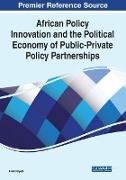- Start
- African Policy Innovation and the Political Economy of Public-Private Policy Partnerships
African Policy Innovation and the Political Economy of Public-Private Policy Partnerships
Angebote / Angebote:
A core political economy issue in the growth literature is how to structure the relationship between the public and private sectors to ensure optimal outcomes. While conventional arguments on the ability of the private sector to intrinsically generate efficiency gains remain valid, governments' traditional role of providing an enabling environment to foster private risk taking for capital accumulation is no less important. African Policy Innovation and the Political Economy of Public-Private Policy Partnerships borrows from contemporary theories of policy change and raises some fundamental questions about the political economy of development in Africa. This book examines the current knowledge and research about the role of public-private policy partnerships in the policy innovation discourse. It contributes a comprehensive, cutting-edge analysis vis-à-vis the appropriateness of contemporary policy devices and paradigms, the compatibility of individualistic analytical frameworks with the African philosophy of Ubuntu, the debate on the rise of neoliberalism versus Africa's traditions and values, and the implications of path dependence for the African Renaissance. From local communities and NGOs to African governments and international development agencies, the author advances a multi-stakeholder development policy and programming framework which recognizes Africa's vastly heterogenous economies and societies. Covering topics such as policy diffusion, demographic shifts, inequality, rentier capitalism, industrial transformation, development finance innovations, venture capital ecosystems, tax policy and supply-side economics, ocean finance, the global minimum tax debate, and higher education under disruptive technologies, this premier reference source is an excellent resource for government officials, policymakers, entrepreneurs, business leaders, libraries, students and educators of higher education, researchers, and academicians.
Folgt in ca. 10 Arbeitstagen
